Vidya Bhawan Rural Institute
PG College Of Arts, Science and Commerce
Affiliated to Mohanlal Sukhadia University, Udaipur (Rajasthan)
Established in 1956, Vidya Bhawan Rural Institute (VBRI) is now a leading postgraduate college in Udaipur. From the beginning, the college has aspired to create a cadre of rural leaders, with a good grounding in diverse social issues. With this in mind, all institution courses expose students to a diversity of social settings and ideas. After six decades of its existence, the institute offers undergraduate and postgraduate programs in Humanities, Social Sciences, Commerce and Science. The present students’ strength is approximately 1029; it also has suitably qualified faculty and service staff.

Vidya Bhawan Rural Institute (VBRI) is one of the premier reputed educational institutes in Udaipur, Rajasthan. VBRI was established in 1956 to impart quality education to the rural segment. In the past six decades, the facilities and the quality of education at VBRI has attracted students from all socio-economic sections of the society in India and also from aboard.
A post graduate college affiliated to Mohanlal Sukhadia University, VBRI has various undergraduate and postgraduate programmes like B.Sc., B.A., B.Com., M.A., M.Sc., along with B.C.A. and B.B.A.. The college also provides research facility in certain disciplines of Arts and Science. The vast lush green campus has a beautiful landscape, well furnished library, laboratories, hostel facility, gymnasium and sprawling playground.
As part of a historic measure to develop Higher Education in rural areas, Government of India appointed a Committee under the Chairmanship of the then Deputy Minister of Education Dr. K.L. Shrimali, who was also one of the founders of Vidya Bhawan. On the report of the Shrimali Committee, the Central Government decided to entrust ten selected institutions in the country the task of establishing Rural Institutes. Vidya Bhawan Society was one of these ten.
So, the ninth anniversary of our Independence Day, 15th August, 1956, saw the birth of Vidya Bhawan Rural Institute (VBRI). The foundation-stone was laid by the Governor of Rajasthan, Shri Sardar Gurmukh Nihal Singh, on the 19th of January, 1957.
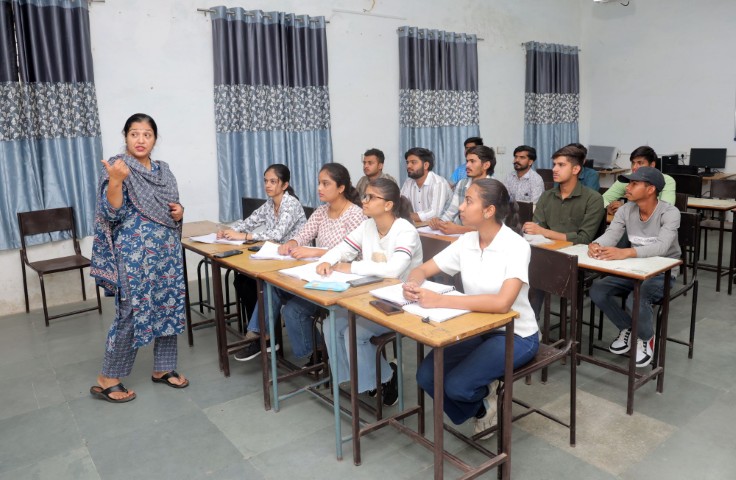
The course on Rural Sociology was first conceived and introduced by VBRI. In its early years, the Institution offered the following courses:
- Rural Services Diploma Course, which was equivalent to graduate degree of any Indian University.
- Post-Graduate Course in Rural Sociology and Community Development.
- Diploma Course in Civil and Rural Engineering.
- One year Sanitary Inspector Course
Department of Rural and Civil Engineering and Department of Extension are now running as separate full-fledged institutes, namely Vidya Bhawan Polytechnic College and Vidya Bhawan Krishi Vigyan Kendra. Vidya Bhawan Rural Institute itself has become a Post-Graduate college.
In the past six decades, the facilities and the quality of education at VBRI has attracted students from all socio-economic sections of the society in India and also from aboard.
The courses offered at VBRI include B.A. (English Literature, Hindi Literature, Sanskrit, History, Geography, Economics, Sociology, Political Science, Rural Sociology and Public Administration,), B.Sc. (Biology, Mathematics, Computer Science), B.B.M., B.Com. and B.C.A.
Post Graduation subjects offered are English Literature, Hindi Literature, Political Science, Economics, Rural Sociology, Analytical Chemistry, Organic Chemistry Mathematics.
In addition to the regular courses, VBRI hosts a regular study centre of Indira Gandhi National Open University (IGNOU), an internationally recognized University, which offers a wide range of degree, diploma and certificate courses.
VBRI is involved in valuable Research work and Faculty members have several papers and publications to their credit. Organizing Seminars and Workshops is a regular feature of the College.
VBRI also caters facilities within the campus to fulfill sports needs of the students. Several students including girls represented University, State and National level in various games such as Volleyball, Archery, Kabaddi, Track events etc.
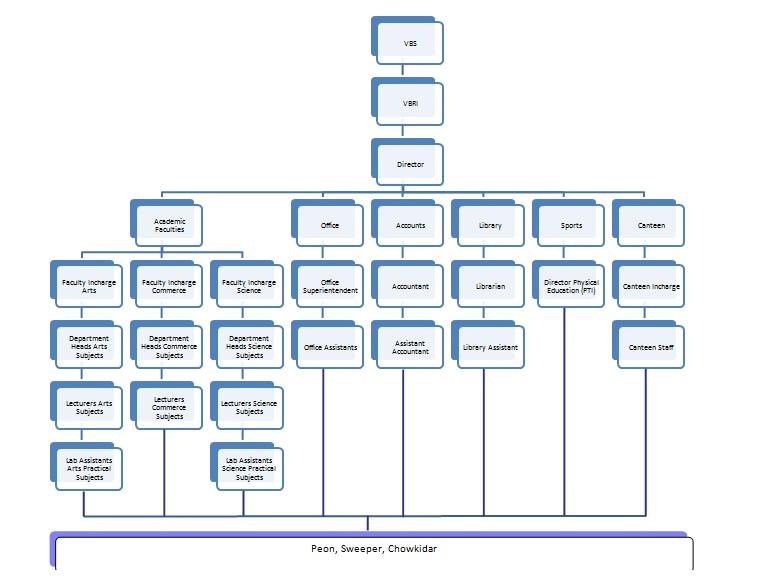
Vision & Mission
Vidya Bhawan Rural Institute strives to cater to the deprived sections of the society by developing sustainable and viable programs, enhancing educational activities and sponsoring academics/support programs, evolving methods of economic empowerment, building community relationships, promoting social welfare organizations; and by initiating efforts in inter-connected socio-economic fields such as education, livelihood, natural resource management, health, women empowerment, and social justice.
Vision
“Empowering rural youth through quality higher education, research and innovations for a better life.”
Mission
- To provide quality higher education.
- To develop research capabilities in faculty and students.
- To inculcate innovativeness through appropriate learning environment.
- To offer new education programmes with a local to global perspective and vice versa.
- To develop sensitivity for responsible citizenship in global environment.
Director's Desk
Prof. Kanika Sharma
Department of Science
To inculcate scientific temperament amongst the youth, Vidya Bhawan Rural Institute offers UG and PG courses in science. The Department of Science is engaged in science education with Botany and Mathematics streams since 1968. In the developing science scenario, the Department added courses, such as B.Sc. Computer Science in 1995 and B.C.A. in 2007.
The Department started PG courses; M.Sc in Analytical Chemistry in 2002, Organic Chemistry in 2006 and M.Sc. Mathematics in 2004. The Department also provides Research facility in Botany, Zoology and Chemistry. VBRI has well equipped Laboratories of Physics, Chemistry, Zoology, Botany and Computer Science.
Department of Commerce & Management
In the changing economic environment across the globe, VBRI realized the need for professionalism in commerce and management; and started B.B.M. programme in 1996, which was the first of its kind in the MLSU. The College has been preparing professionals to meet the challenges and to make their mark in the global business scenario. With the rapid growth of banking and financial sectors in the country, the demand for skilled accountants has increased. To fulfill this gap, the Department started B.Com. in 2006.
Under Graduate Courses (UG)
| ARTS | SCIENCE | COMMERCE | MANAGEMENT | COMPUTER |
| Hindi Literature | B.Sc. (Botany, Zoology, Chemistry) | B.Com. | B.B.A | B.C.A. |
| English Literature | B.Sc. (Physics, Chemistry, Mathematics) | |||
| Sanskrit | B.Sc. (Physics, Computer, Mathematics) | |||
| Economics | ||||
| Public Administration | ||||
| Political Science | ||||
| Geography | ||||
| Sociology | ||||
| History | ||||
| Rural Development and Extension |
Post Graduate Courses (PG)
| ARTS (M.A.) | SCIENCE (M.Sc.) | |
| Hindi Literature | Analytical Chemistry | |
| English Literature | Organic Chemistry | |
| Economics | Mathematics | |
| Political Science | ||
| Rural Sociology |
Doctorate of Philosophy (Ph.D)
Research facilities for Ph.D. Degree is available in following subjects:
Political Science, History, Sociology, Botany, Zoology, Chemistry, Physical Education
Note: Admission for Ph.D. will be on the basis of the University entrance test followed by personal interview conducted by the respective departments. All candidates admitted for Ph.D. will be required to complete one semester course work. Details are available at the Mohanlal Sukhadia University website.
Under Graduate (U.G.)
Bachelor Of Arts (NEP)
Bachelor Of Science (NEP)
Bachelor Of Commerce (NEP)
Combination | Subject | Subject | Subject |
Commerce group | BADM | ABST | BBE |
Bachelor Of Computer Application (NEP)
Bachelor of Computer Application (BCA)
A Three-Year Undergraduate Degree Course
The Bachelor of Computer Application (BCA) is a three-year undergraduate degree program in computer applications. With the rapid growth of the IT industry worldwide, the demand for computer professionals is increasing day by day.
BCA is a popular course among students who want to build a career in the IT field. The course covers subjects like databases, networking, data structures, and core programming languages such as C, C#, Java, and Python.
There is immense scope in the field of BCA. Graduates can either seek jobs or pursue higher studies after completing the course. Self-employment opportunities are also available, including freelancing and software development for those with the required skills. Many multinational companies (MNCs) offer job opportunities to BCA graduates. Candidates with work experience and the necessary skills can secure high positions in MNCs. While BCA provides students with strong technical knowledge, pursuing an MCA is recommended for career advancement. In this digital age, knowledge of computers provides a distinct advantage.
Eligibility Criteria:
Candidates must have passed the 10+2 examination with at least 50% marks in aggregate (pass marks for SC/ST and OBC candidates) in any stream.
Course Duration:
The BCA course spans three years (six semesters). Each academic year carries approximately 40 credits as per the MLSU BCA NEP syllabus.
Medium of Instruction:
The medium of instruction and examination is English.
Objectives:
- Provide an in-depth understanding and experience with computer systems.
- Develop creative and analytical skills essential for technological problem-solving.
- Equip students to handle multi-tasking situations.
- Cater to students aspiring to excel in the field of computers.
- Introduced in the 2007-08 academic session as an interdisciplinary program, BCA also covers subjects like Accounting and Financial Management, Personality Development, and Communication Skills.
- The course provides a solid academic foundation for an advanced career in Computer Applications. Graduates can start as Junior Programmers and advance to positions such as Senior Programmers and Project Managers in the IT sector.
Future Prospects:
BCA graduates have a bright future in the Computer and IT industry. They can take up jobs as Programmers and advance to Project Managers. A postgraduate degree in the relevant field, such as MCA or MBA, is always preferred for career growth.
These undergraduate courses serve as pre-qualifications for professionals aiming for a successful career in the IT sector, meeting international standards. Graduates can pursue higher studies at UGC-recognized universities or reputed institutions in India and abroad or opt for technical jobs.
Job Potential:
There is tremendous scope for employment in industries and research organizations, both in India and abroad. The Indian IT industry has witnessed rapid growth, creating high demand for graduates in areas such as:
- Software Development
- Network Administration
- Hardware & System Maintenance
Bachelor Of Business Administration (Semester)
Bachelor of Business Administration (BBA)
A Three-Year Professional Degree Course
In this age of economic liberalization and globalization, courses related to management, economics, finance, etc., have gained significant importance. Recognizing this trend, in 1996, VBRI pioneered the introduction of this course at the undergraduate level. Students who graduate from this institute secure admissions in prestigious colleges and institutions such as IIM, ICFAI, S.P. Jain Institute of Management, Nirma Institutes of Management, FMS Delhi University, and Symbiosis-Pune for higher studies in Management.
The BBA program broadens career horizons and opportunities for students aiming for a career in the corporate sector. It provides in-depth knowledge of various functional areas of management, finance, economics, computer applications, and quantitative techniques. The course is designed to enable students to understand and improve their ability to make vital financial and administrative decisions. Classes are conducted under the semester system.
Objectives:
- Explore managerial skills in students.
- Develop intellectual and behavioral competencies.
- Prepare future professionals and create learning opportunities.
- Inculcate entrepreneurial skills and leadership qualities.
- Provide quality education with a global mindset.
Industrial Visits & Case Studies:
Regular industrial visits are arranged at different industries, providing students with exposure to operational activities. Case studies are integrated as a value-added learning method for BBA students. These visits and studies help students gain practical knowledge, enhancing their interpersonal skills and communication techniques.
Eligibility:
Senior Secondary (10+2) pass students from any discipline with a minimum of 48% marks (for students outside Rajasthan: 60% marks). SC/ST/OBC candidates are eligible with minimum passing marks.
Post Graduate (P.G.)
Master of Arts (M.A.) (NEP)
M.A.(Political Science, Rural Sociology, English literature, Hindi literature, Economics
Introduction: The M.A. in all five subjects program offers an in-depth understanding of the physical and human aspects. The curriculum is designed to provide knowledge of advanced geographical concepts, research methodology, and practical applications.
Eligibility:
- Undergraduate degree in any discipline. (10+2+3 system).
- As per university norms.
Seats Available: 40
Master of Science (M.Sc. Mathematics – NEP)
M.Sc. (Mathematics)
Introduction: Vidya Bhawan Rural Institute introduced the M.Sc. Mathematics program in 2004.
Eligibility:
- Undergraduate degree in Science with Mathematics (10+2+3 system)
- Minimum 50% overall marks or 55% in Mathematics (SC/ST/OBC candidates qualify with minimum pass marks).
Seats Available: 20
Reservation: As per government regulations for SC/ST/OBC categories.
Master of Science (M.Sc. Chemistry – NEP)
M.Sc. (Chemistry)
The Vidya Bhawan Rural Institute offers two specializations under the M.Sc. Chemistry program:
(i) Analytical Chemistry
Introduction: Established in 2002, this job-oriented program prepares professionals for careers in chemical industries. Analytical Chemistry is a crucial branch focused on research and precise chemical analysis.
Eligibility:
- Science Graduate (10+2+3 system) with at least 50% aggregate marks or 55% marks in Chemistry.
- SC/ST/OBC students qualify with minimum pass marks.
Seats Available: 20 (19 + 1 reserved for Vidya Bhawan staff ward)
(ii) Organic Chemistry
Salient Features:
- Modern laboratory with instruments like Spectrophotometer, Polarograph, Flame Photometer, Karl Fischer Titrator, and Colorimeter.
- Experienced faculty trained in the latest techniques.
- Industrial visits.
- Regular seminars and guest lectures by eminent professors.
- Well-stocked library with standard textbooks.
Seats Available: 20 (19 + 1 reserved for Vidya Bhawan staff ward)
Admission Criteria:
- Merit-based admission, considering marks obtained in the M.Sc. Previous Examination.
- If fewer than 10 students enroll, the course fees will be refunded.
Skill Based Certificate Courses
In session 2022-23, Vidya Bhawan Rural Institute has started a 5 skill based short term course for first year students of all streams to provide basic skills. These courses are
1. Course in Website Development – Co-ordinator Sh. Sonesh Bhatia
2. Course in Retail Management– Co-ordinator Dr. Harshita Bhatnagar
3. Course in Rural extension and Management– Co-ordinator Dr. Manoj Rajguru
4. Course in Spoken English and soft skill development – Co-ordinator Dr. Neelu Tiwari
5. Course in Yoga– Co-ordinator Dr. Neeru Shrimali
These multiple skill Programmes are focused on making rural and economically disadvantaged students self-reliant through innovative training that can help them earn while they learn. After so many obstacles around 90 students has successfully completed these courses with full zeal and enthusiasm. This course has imparted practical learning to the students which makes them ready for the rewarding career in the different sector. All first year students have enrolled in one of these courses based upon their own choices. Despite the immense challenges, we finally commenced our classes in which experts from academics and industry have visited and delivered lectures on myriad topics. Visiting experts admires us for running these skill courses and have shown their willingness to give their support in any form.
Demand for highly professional, skilled and trained employees has made skill education a necessity in India. Around 90 students of different courses were awarded certificates based upon their regularity in the classes, assignments, field visits, and presentations along with internal and external exams. Many retail companies like Zudio, Max, Reliance, Pantaloons approached us to provide job opportunities and on the job training to these students in their retail stores. Being a first year students, they prefer to continue their studies instead of doing job right now but they were happy to know that they are now self reliant.
Campus
Vidya Bhawan Rural Institute is located at Badgaon, near the city of lakes Udaipur in southern Rajasthan. The College is situated in 60 acres of green, clean and serene environment.
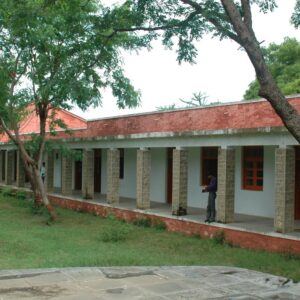
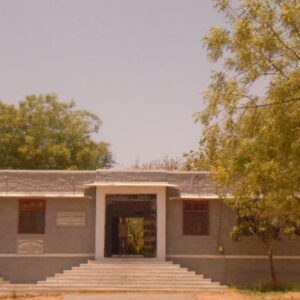
Library
The College has a well stocked library with networked computers. A rich collection of more than 44 thousand books cover diverse spheres of social sciences and humanities, science, commerce and management. A range of encyclopedias, research journals, magazines and newspapers are also available to students and faculty members.

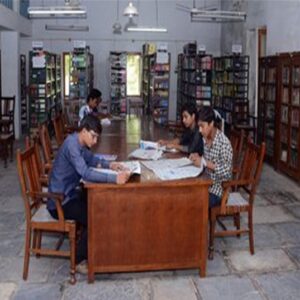
Reading Room
A special reading room is located on the 1st floor of the library for students and scholars who wish to have their space to engage in rigorous academics.
Book Bank
The Book Bank facility is available for all students. Presently, the students avail benefit of 8518 text-books in the Book Bank. Each student can take a maximum of 6 text-books for the entire academic year by paying 20% of the printed price of the book.
Statement of Library Holdings
| Sr. No. | Particulars | Grand Total |
| 01. | Social Sciences & Humanities | 20061 |
| 02. | Science | 11018 |
| 03. | Computer | 1258 |
| 04. | Commerce & Management | 1740 |
| 05. | Reference & General Knowledge | 1559 |
| Cumulative Total | 35636 | |
| 06. | Book Bank | 8542 |
| Cumulative Grand Total | 44178 |
Periodicals and Newspapers
| Sr. No. | Particulars | Categories | Nos. |
| 01. | Newspapers (Total 15) | 01. National | 07 |
| 02. Local | 05 | ||
| 03. Employment related | 03 | ||
| 02. | Journals/ Magazines (44) | 01. Weekly | 04 |
| 02. Monthly | 25 | ||
| 03. Fortnightly | 03 | ||
| 04. Quarterly | 04 | ||
| 05. Half Yearly | 06 | ||
| 06. Yearly | 02 |
Laboratories
The College has separate laboratories for Physics, Chemistry, Botany, Zoology, Computer, Rural Sociology and Geography. All laboratories are well equipped to meet the requirements of teaching and learning as per the syllabus.
Computer Science Laboratories
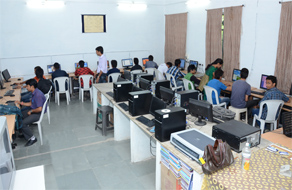
Two fully furnished Computer Science Labs have 60 computers with peripherals like Hi-DPI scanners, printers and projectors. The College has internet with Wi-Fi facility.
Physics Laboratory
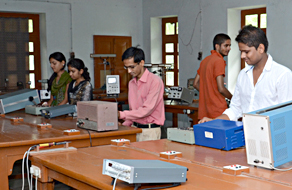
Theoretical science is put to practice at the Physics Lab, where latest equipments are available to students for hands-on application of different theories
Chemistry Laboratories

Six well equipped Chemistry Labs have instruments like UV/Vis spectro photometer, polarograph, karl fisher and flame photometer apart from regular features.
Botany Laboratories
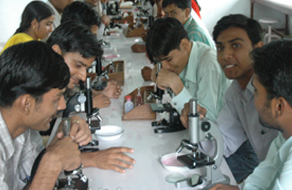
Two Botany Laboratories have numerous specimens and provide all the necessary facilities to understand and learn about the vivid flora.
Zoology Laboratory
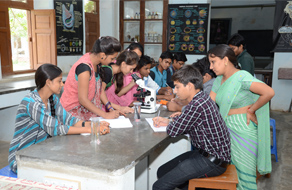
Microscopes and other equipment bring to fore the story of life in the Zoology Lab, which has turned digital too. The dissections will be done digitally.
Geography Laboratory

Charts, maps, models, wooden based light-globe, survey instruments, GPS, telescope and ‘The Times’ world atlas are part of the extensive learning materials available at the Geography Lab.
Digital Language Laboratory
The College has hi-tech language learning gadgets installed in its digital Language Laboratory. Along with conceptual clarity, English language skills of the students are developed considering the present milieu. Students use display screen with graphical images. Teachers pay individual attention to pronunciations. Students spend good.

Sports
VBRI has indoor and outdoor games facilities. Two playgrounds are used for Football, Hockey, Kho-Kho, Cricket and various track and field events. Kabaddi and Volleyball are played on separate courts.
Indoors
(1) Gymnasium
(2) Table-Tennis
(3) Carom
(4) Chess
Outdoors
(1) Volleyball
(2) Basketball
(3) Kho-Kho
(4) Hockey
(5) Football
(6) Cricket
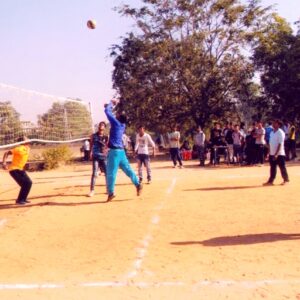


Canteen
The College has canteen facility for the students and staff. Spacious and hygienic, the canteen accommodates 40 people at a time.
Girls Common Room
The College has established a separate Common Room for girls. The room has been designed to give female students a comfortable place to unwind, study and have informal discussions. The room is well lit and ventilated; and has a relaxed friendly ambiance.
Staff Quarters
VBRI has over three dozen residential quarters available for teaching staff and class-IV staff. The quarters are situated in a natural and serene atmosphere.
Hostel
Vidya Bhawan Rural Institute provides hostel facility for boys within the campus. Hostel has accommodation for 60 students. Well furnished spacious rooms have all amenities; including 24×7 power and water supply, television, water purifier and kits for indoor and outdoor games. Canteen is nearby! The building surrounds a playground for hostlers. First aid facility is available for any eventuality and a hospital is in close proximity.
Director Dr. Tej Prakash Sharma, Director, VBRI, has more than 13 years of teaching experience. He did his Ph.D. from Mohan Lal Sukhadia University in 2002. He has been actively engaged in the field survey and documentation of Bryophyte Flora in general and Bryidae in particular in India. Dr. Sharma co-authored two books on Biology. He has 20 Research Papers under his name which have been published in renowned national and international journals. Dr. Sharma has a dynamic approach towards academics and administration, which motivates the faculty, staff and students to achieve academic goals.
Books:
Bryophyte Flora of Gujarat (India), by B.L. Chaudhary, T.P. Sharma, Charu Sanadhya. Himanshu Publication, Udaipur/New Delhi, 2006.
Bryophyte Flora of North Konkan, Maharashtra (India), by B.L. Chaudhary, T.P. Sharma, F.S. Bhagora. Himanshu Publication, Udaipur/New Delhi, 2008.
Arts
| Name | Photo | Qualification | Designation | Date Of Joining |
| Dr. Shriram Arya |  | M.A., M.Sc., N.E.T., Ph.D. | HOD Sociology Incharge RD & Ext,Research Guide | 01-09-2012 |
| Dr. Archana Jain |  | M.A., Ph.D. | H.O.D. (Sanskrit) | 02-07-2007 |
| Dr. Saraswati Joshi |  | M.A., N.E.T., Ph.D. | Faculty Head, Arts, HOD -Hindi | 01-09-2012 |
| Dr. Sameer Vyas |  | M.A. (Gold Medalist), Ph.D. | H.O.D. (History), Research Guide | 01-07-2013 |
| Dr. Manoj Rajguru |  | M.A., M.Phil., S.L.E.T., Ph.D. | H.O.D.(Political Science), Research Guide | 03-09-2012 |
| Dr. Kanchan Paneri |  | M.A., M.Phil., S.E.T., Ph.D. | Sociology, Research Guide | 06-08-2014 |
| Dr. Ratanlal Suthar |  | M.A., M.Phil., S.E.T., Ph.D. | H.O.D.(Public Administration) | 16-09-2014 |
| Dr. Vikas Baya |  | M.A., N.E.T., S.E.T, Ph.D. | H.O.D.(Geography) | 01-09-2012 |
| Dr. Jyoti Kanthaliya |  | NET, M.Phil, Ph.D, B.Ed | H.O.D. (Economics) | 05-04-2017 |
Sciences
| Name | Photo | Qualification | Designation | Date Of Joining |
| Dr. Laxman Singh Rajput |  | M.C.A., Ph.D. | Lecturer (Computer) | 01-07-2003 |
| Mr. Sonesh Bhatia |  | M.C.A., N.E.T., S.E.T. | Faculty Head Science, (Computer) | 19-07-2006 |
| Dr. Cheshta Sharma |  | M.Sc. Electronics (Gold Medalist), N.E.T., M.Sc. Computer Science, PhD | H.O.D. (Computer) | 16-07-2008 |
| Mr. Anand Bhavsar |  | B.C.A., M.A. | Lab Assistant | 21-08-2015 |
| Name | Photo | Qualification | Designation | Date Of Joining |
| Dr. Anita Jain |  | M.Sc., Ph.D. | H.O.D. (Botany), Research Guide | 09-08-2010 |
| Dr. Nisha Razdan |  | B. SC, B.Ed, M.Ed (M.A in Edu), M.A (Sociology), Gold Medalist, Ph.D (Sociology), PGDRD | Lab Assistant (Botany) | 22-08-2009 |
| Dr. Anju Jain |  | M.Sc., Ph.D. | Lecturer (Chemistry) | 02-07-2007 |
| Dr. Saba Khan |  | M.Sc., Ph.D. | Lecturer (Chemistry), Additional In-charge (Physics) | 02-08-2004 |
| Dr. Daksha Sharma |  | M.Sc., M.Phil., Ph.D. | Lecturer (Chemistry) | 02-07-2007 |
| Dr. Manish Rawal |  | M.Sc., Ph.D. | H.O.D. (Chemistry) | 08-07-2009 |
| Dr. Rehana Khanam |  | M.Sc., S.E.T., Ph.D. | Lecturer (Chemistry), Research Guide | 01-09-2012 |
| Mrs. Kumud Paliwal |  | B.Sc, B.Ed. | Lab. Assistant | 20-11-2007 |
| Mrs. Rekha Sharma |  | M..Sc. , B.Ed. | Lab. Assistant | 01-09-2012 |
| Dr. Sushma Jain |  | M.Sc., Ph.D. | H.O.D. (Zoology), Research Guide | 09-08-2010 |
| Mrs. Bhawana Lohar |  | B.Sc. , M.A., B.Ed | Lab. Assistant | 21-08-2009 |
| Dr. Barkha Rani Tripathi |  | M.Sc(Gold Medalist), Ph.D | H.O.D. (Mathematics) | 01-09-2017 |
Commerce & Management
| Name | Photo | Qualification | Designation | Date of Joining |
| Dr. Kavita Ajmera |  | M.Com., Ph.D. | H.O.D. (Accounts & Statics) | 16-07-2008 |
| Dr. Anushree Sharma |  | M.Com., M.B.A., Ph.D. | H.O.D.(Banking and Economics) | 16-07-2008 |
| Dr. Kiran Asnani |  | M.Com., M.Phil., N.E.T., Ph.D. | Faculty Head (Commerce & Management), Lecturer Business Administration | 02-08-2008 |
| Dr. Harshita Bhatnagar |  | M.B.A. (Gold Medalist), M.com, NET, S.E.T., Ph.D. | HOD (Business Administration/BBA) | 12-08-2010 |
| Dr. Pinky Soni |  | M.Com., M.Phil., S.L.E.T., N.E.T., Ph.D. | Lecturer (Accounts and Statistics) | 01-09-2012 |
Non Teaching Staff
| Name | Photo | Designation | Date Of Joining |
| Mr. Deepak Prajapat |  | Office Superintendent | 01-10-2012 |
| Mr. Mohan Lal Kumhar |  | Office Assistant | 01-01-2007 |
| Sh. Lalit Menaria |  | Office Assistant | 14-05-2012 |
| Mr. Naresh Sahu |  | Librarian | 17-10-2012 |
| Mr. Shankar Lal Khatik |  | Technical Assistant (Library) | 20-09-1994 |
| Dr. Neeru Shrimali | 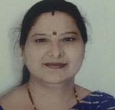 | Lecturer Physical Education, Research Guide | 21-09-2016 |
| Mr. Umanath Sharma |  | Peon | 01-05-2005 |
| Mr. Sohan Lal Meghwal |  | Peon | 01-10-1999 |
| Mr. Pankaj |  | Peon | 17-08-2008 |
| Mr. Toliram |  | Peon | 06-01-2010 |
| Mr. Kishan |  | Peon | 11-09-2009 |
| Mr. Naru Lal |  | Peon | 11-10-2011 |
| Mr. Mukesh Singh |  | Peon | 15-10-2014 |
Fee Structure 2025-26
Form Fee: Rs. 350 for I Year & Rs. 300 for remaining years
| Course | I Year | II Year | III Year |
|---|---|---|---|
| B.A. (With Practical Subject) | 20300 | 17610 | 18110 |
| B.A. (Without Practical Subject) | 18510 | 16510 | 16410 |
| B.Sc. (Bio/Maths/Computer) | 24960 | 22510 | 20610 |
| B.Com. | 18510 | 16510 | 16310 |
| B.C.A. | 26560 | 22310 | 22310 |
| B.B.A. | 25010 | 22310 | 21210 |
| Course | Previous | Final |
|---|---|---|
| M.A. | 14810 | 13510 |
| M.Sc. (Chemistry) | 35710 | 33210 |
| M.Sc. (Mathematics) | 21410 | 18510 |
Alumni Association
Vidya Bhawan Rural Institute is one of the oldest Colleges of the region. The alumni of VBRI are spread from villages to across India and abroad. Old students and faculty had often expressed their wish to again meet their old buddies, re-visit the bygone days and make a positive contribution to the future of the College. To provide such a platform, an Alumni Association was founded in 2013. The first meeting was attended by about 50 members, who made the Constitution of the Association. The main objectives are to promote social and cultural interests of the alumni, through meetings and publications, and to contribute in the development of the College.
Students at VBRI can avail scholarships of Government of India, Government of Rajasthan and fees relaxations as per VBS rules.
- Scholarship for Socially and Financially Weaker Sections:
Eligibility
The Scholarship is available to students studying in a recognized university at any level.
The annual income of the family of SC, ST, SBC students should be less than Rs.2.5 Lakhs.
The annual income of the family of OBC students should be less than Rs.1 Lakh.
Committee Members:
Dr. Kanchan Paneri (Nodal Officer)
Mr. Anand Bhavsar(Member)
For further details and updates log on to: www.sje.rajasthan.gov.in
E-mail: [email protected]
Help-Desk Number: 1800-180-6127
2. Minority Scholarship:
Post-metric Scholarship
Post-metric scholarship is awarded for studies in India, in a government or private higher secondary school/college/university, including such residential institutes of the Government and eligible private institutes which are selected and notified in a transparent manner by the concerned State Government/Union Territory Administration. It also covers technical and vocational courses in Industrial Training Institutes/Industrial Training Centers affiliated with the National Council for Vocational Training (NCVT) for the level of classes XI and XII.
Eligibility-
Scholarship will be awarded to the students who have secured not less than 50% marks or equivalent grade in the previous final examination and the annual income of whose parents/guardian from all sources does not exceed Rs.2 Lakhs.
Distribution-
Muslim, Sikh, Christian, Buddhist and Zoroastrian (Parsi) have been notified as minority communities under Section 2 (c) of the National Commission for Minorities Act, 1992. The distribution of scholarship among the States/Union Territories will be made on the basis of population of the above notified minorities in the States/Union Territories as per Census 2001.
Earmarking for Girl Students-
30% of scholarships will be earmarked for girl students. In case sufficient numbers of eligible girl students are not available, then the balance earmarked scholarships may be awarded to eligible boy students.
Selection Procedure-
The number of scholarships for minorities is fixed. Students from BPL families, having the lowest income shall be given preference in the ascending order. The renewal applications should be fully exhausted before the new applications are considered.
Duration-
Scholarship will be provided for the entire course. However, maintenance allowance will be given for a period not exceeding 10 months only in an academic year.
Committee Members-
Dr. Anju Jain (Co-ordinator)
Mrs. Rekha Sharma (Member)
3. Scholarship on Merit-cum-Means basis:
Conditions for Scholarship on Merit-cum-Means basis are as under-
The annual income of the beneficiary/parent or guardian of beneficiary from all sources should not exceed Rs.2.50 Lakhs.
Students who get admission to a college to pursue technical/professional courses, on the basis of a competitive examination will be eligible for the scholarship.
For further details and updates log on to: www.momascholarship.gov.in
Chief Minister Higher Education Scholarship
Chief Minister Higher Education Scholarship is awarded to students who have achieved meritorious positions.
Eligibility-
The students who have passed 12th in 2013 from Rajasthan Board of Secondary Education with 60% or above marks.
The annual income of the family should be less than Rs.2.5 Lakhs.
He/she should have domicile certificate of Rajasthan.
He/she should not be enrolled with any other scholarship schemes.
For further details and updates log on to: www.dce.rajasthan.gov.in/
Documents Required-
- Mark-sheet 10th Class (Photo copy).
- Mark-sheet last examination passed (Photo copy).
- Income certificate (Original).
- Affidavit on Rs.10 Non-Judicial Stamp Paper (Original).
- Cast certificate (Photo copy).
- Bank passbook (Photo copy).
- Aadhaar Card is mandatory (Photocopy).
Note : (All mark-sheets and certificates should be attested by a gazette officer).
Committee Members-
Dr. Anju Jain (Co-ordinator)
Mrs. Rekha Sharma (Member)
4. VBS Scholarship: Eligible students will get scholarship after proper enquiry & scrutining.
Committee Members-
Dr. Vikas Baya (Co-ordinator)
Dr. Nisha Razdan (Member)
NSS
The college has two units of National Service Scheme (NSS), where students are trained for social services. The main works carried out by the NSS units are tree plantation, general awareness, literacy projects, community health programs, debates/discussions on socially relevant issues (like dowry, AIDS, prohibition on liquor etc).
In case of emergencies and other traumatic conditions NSS volunteers donate blood. They also work on campus beautification. Camps are organised from time to time. The activities channelize the energy of youth in constructive works. Students who work regularly for two years get a Certificate. Such students get bonus marks/ priority in admissions as per the Government rules.
Dr. Archana Jain & Dr. Jyoti Kanthalia
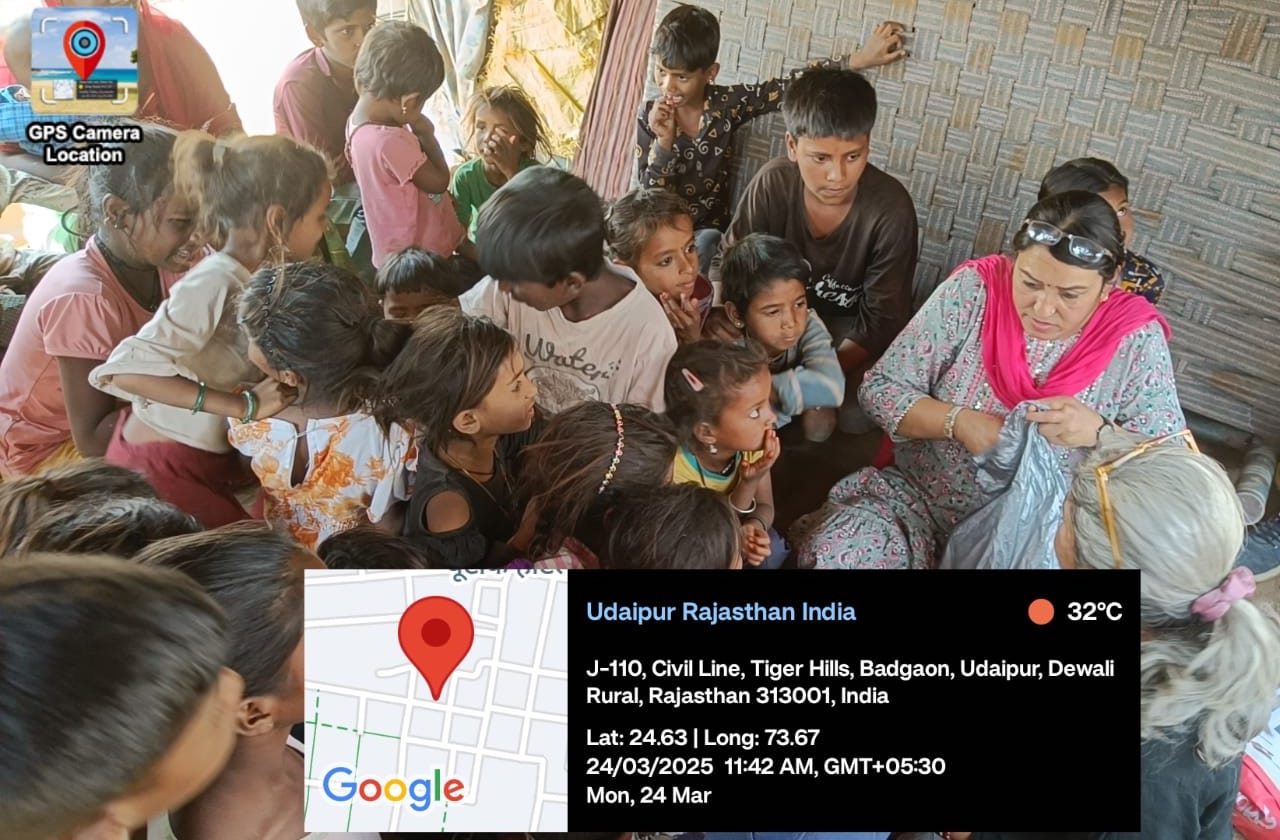
Rover Unit
Rover Scouting is a service division of Scout for young men, and women. A group of Rovers, analogous to a Scout troop, is called a ‘Crew. The purpose of the unit is to develop the inherent potential of the young people by providing them a number of structured activities in order to make them physically, mentally, socially, spiritually and emotionally strong and useful citizens of the Nation.
Principles:
- Duty to God
- Duty to Others
- Duty to Self
Rangers and Rovers:
The Rangers and Rovers fall under the Scout and Guide movement. Bharat Scout and Guide is a voluntary, non–political, educational movement for young people, open to all without distinction of origin, race or creed, in accordance with the purpose, principles and method conceived by the founder Lord Baden Powell in 1907.
The purpose of the movement is to contribute to the development of young people in achieving their full physical, intellectual, social and spiritual potentials as individuals, as responsible citizens and as members of the local, national and international communities.
The mission of Scouting is to contribute to the education of young people, through a value system based on the Scout Promise and Law to help build a better world where people are self-fulfilled as individuals and play a constructive role in society.
Dr. Shri Ram Arya
Placement Cell
Our Campus Recruitment Program starts by the beginning of the Pre-final semester.
VBRI’s Placement Cell has a three step programme:
- To provide a feel of the industry environment to the students and orient them on various business and industry prospects.
- To support students in search of jobs and prepare them to write applications, resume and face interviews.
- To contact and stay in touch with the prospective business houses; and arrange Campus Recruitments and Off-Campus Interviews
Dr. Ratan Lal Suthar and Dr. Harshita Bhatnagar
The mission of higher education and research is to help ensure the country’s public, cultural and economic prosperity, provide support and impetus for a full life of every citizen, and satisfy the natural thirst for knowledge. Quality assurance is the guarantee to maintain a certain level of quality according to target goals.
Internal quality corresponds to the improvement of Institution’s internal operations. The purpose of internal quality is to implement the means that make it possible to best describe the organization, and to spot and limit dysfunction. A “quality spirit” must be developed and shared by all in order for total quality management to succeed. Higher education and research institutions shall be responsible for the quality of research (artistic) activities, studies and other activities.
As per National Assessment and Accreditation Council (NAAC) guidelines every accredited institution should establish an Internal Quality Assurance Cell (IQAC) as a post-accreditation quality sustenance measure. Since quality enhancement is a continuous process, the IQAC becomes a part of the institution’s system and works towards realization of the goals of quality enhancement and sustenance.
The prime task of the IQAC is to develop a system for conscious, consistent and catalytic improvement in the overall performance of institutions. During the post-accreditation period, the IQAC will channelize the efforts and measures of an institution towards academic excellence.
Vidya Bhawan Rural Institute was accredited by NAAC in 2006 for the first cycle and later in 2014 for the second cycle. IQAC established at Vidya Bhawan Rural Institute continued to strive for the betterment of processes and setup.
Session-wise IQAC Reports of the College are as follows –
IQAC minutes of meeting 2024-25
IQAC minutes of meeting 2023-24
IQAC minutes of meeting 2022-23
IQAC minutes of meeting 2021-22
IQAC_minutes of meeting 2020-21
IQAC_minutes of meeting 2019-20
AQAR DATA 2023-24
Annual Gender sensitization plan 23-24
Special facilities provided for women 23-24
Students_survey_report__Digital_Teaching_learning_facility
Notice_for_compulsion_of_Helmet
The Study Centre of IGNOU at VBRI was established in January 2003. the centre offers 60 courses like MCA, MBA, MA RD, M.Com. PGDRD, MTM, BA, BCom, BCA, BTS, CTS, BPP etc. “, this Study Centre- 2302 is under the IGNOU Regional Office at Jodhpur.
The purpose is to provide equal opportunities for education to all sections of the Society; to bring into the mainstream those deprived of education; to provide facility for higher education to the working class and to make possible affordable quality education.
IGNOU Coordinator – Dr. Laxman Singh
IGNOU Centre Contact No. (0294) 2452107
The Centre remains closed on Wednesdays.
About IGNOU
The Indira Gandhi National Open University (IGNOU), established by an Act of Parliament in 1985, has continuously striven to build an inclusive knowledge society through inclusive education. It has tried to increase the Gross Enrollment Ratio (GER) by offering high-quality teaching through the Open and Distance Learning (ODL) mode. The University began by offering two academic programmes in 1987, i.e., Diploma in Management and Diploma in Distance Education, with a strength of 4,528 students
Today, it serves the educational aspirations of over 4 million students in India and 36 other countries through 21 Schools of Studies and a network of 67 regional centres, around 3,000 learner support centres and 67 overseas centres.
The University offers about 490 certificate, diploma, degree and doctoral programmes, with a strength of nearly 420 faculty members and academic staff at the headquarters and regional centres and about 36,000 academic counsellors from conventional institutions of higher learning, professional organisations, and industry among others.
Two students of VBRI in University Gold Medal list

Bharat Choudhary

Dharini Jain
Vidya Bhawan Rural Institute has been involved in various academic publications. These include books and magazines on wide ranging subjects. The faculty ensures that the students take active part in content creation as well as in the process of printing. Under the guidance of the faculty members, students have brought out quality magazines. A glimpse of the publications is presented here.
Research Journal
Vidya Bhawan Journal of Interdisciplinary Research was released on 10 December 2014 by Shri Riaz Tehsin, President, Vidya Bhawan Society. The Chief Editor is Prof. Arun Chaturvedi and the Managing Editor is Dr. T.P. Sharma.
Volume-1 of the bi-lingual Journal carries 10 Articles, 5 Notes and Comments, 4 Book Reviews and one Summary of Thesis in the areas of science, literature, environment, management, education, history, sociology, political science, etc.
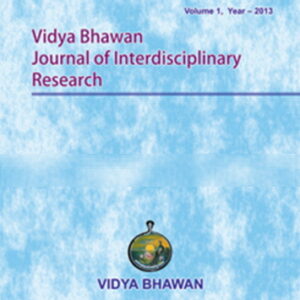
Books
About The Book
The interest in business ethics accelerated during the 1980s and 1990s with the adoption of neo liberal economic policies across countries. Modern businesses are increasingly accepting the need to behave ethically so as to be successful in the long run. Business without sound ethics have eventually collapsed and their profit shrunk overtime as have been in evident form the experiences of Enroh Lehman Bros, Satyam Computers and many such disasters. Happening of such events raises question about the basic values of owners and managers and thus requires examinations of the behaviours of business enterprises. This book is a collection of selected papers that were presented in the UGC sponsored National seminar on Business Ethics: Emerging Paradigm focusing on is issues like strategic perceptive in Business Ethics and human behaviour. Business ethics and corporate governance Indian ethics in business management and business ethics and Globalisation.

Book Authored
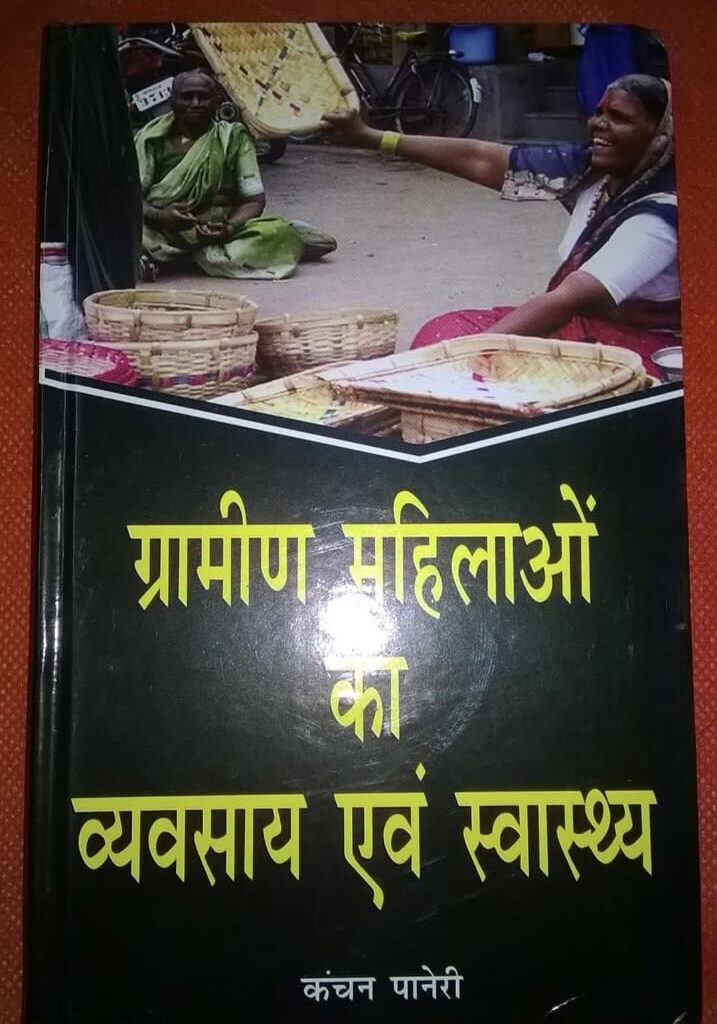

Faculty Publications
| Name of the Faculty Member | Department | Number of Publications | Number of Seminars / Workshops / FDP etc. | |||
| Papers | Books | Abstract / Chapters in Books | Organised | Attended | ||
| Dr. Anita Jain | Botany | 51 | 04 | 03 | 10 | 40 |
| Dr. Anju Jain | Chemistry | 05 | 0 | 0 | 0 | 30 |
| Dr. Anushree Sharma | Banking & Economics | 07 | 01 | 02 | 01 | 20 |
| Dr. Archana Jain | Sanskrit | 05 | 01 | 0 | 0 | 15 |
| Dr. Barkha Rani Tripathi | Mathematics | 17 | 0 | 0 | 0 | 27 |
| Mrs. Cheshta Sharma | Computer | 02 | 0 | 05 | 0 | 0 |
| Dr. Daksha Sharma | Chemistry | 15 | 0 | 02 | 01 | 35 |
| Dr. Harshita Bhatnagar | Business Administration | 18 | 0 | 1 | 03 | 40 |
| Dr. Jyoti Kanthaliya | Economics | 05 | 0 | 0 | 0 | 15 |
| Dr. Kanchan Paneri | Sociology | 09 | 02 | 0 | 20 | 30 |
| Dr. Kavita Ajmera | Accounts & Statistics | 04 | 0 | 0 | 0 | 35 |
| Dr. Kiran Asnani | Business Administration | 10 | 0 | 0 | 0 | 35 |
| Dr. Laxman Singh | Computer | 03 | 0 | 03 | 0 | 15 |
| Dr. Manish Rawal | Chemistry | 16 | 0 | 06 | 0 | 26 |
| Dr. Manoj Rajguru | Political Science | 20 | 10 | 05 | 03 | 40+ |
| Dr. Pinky Soni | Accounts & Statistics | 09 | 0 | 0 | 0 | 20 |
| Dr. Ratan Suthar | Public Administration | 03 | 0 | 03 | 0 | 35 |
| Dr. Rehana Khanam | Chemistry | 30 | 08 | 01 | 0 | 70 |
| Dr. Saba Khan | Chemistry | 28 | 03 | 0 | 0 | 57 |
| Dr. Sameer Vyas | History | 13 | 13 | 0 | 0 | 13 |
| Dr. Saraswati Joshi | Hindi | 08 | 01 | 04 | 0 | 30 |
| Dr. Shriram Arya | Sociology | 40 | 13 | 0 | 0 | 30 |
| Mr. Sonesh Bhatia | Computer | 04 | 0 | 06 | 01 | 15 |
| Dr. Sushma Jain | Zoology | 25 | 03 | 02 | 01 | 30 |
| Dr. Tej Prakash Sharma | Botany | 16 | 02 | 02 | 0 | 16 |
| Dr. Vikas Baya | Geography | 09 | 01 | 0 | 0 | 15 |
| Dr. Nisha Razdan | Botany | 07 | 0 | 08 | 0 | 52 |
| Dr. Neelu Tiwari | English | 0 | 0 | 01 | 0 | 0 |
| Dr. Bharatraj Singh | Chemistry | 06 | 0 | 05 | 0 | 10 |
Research
| # | Name | Subject | Scholar Currently Enrolled | Degree Awarded |
|---|---|---|---|---|
| 1 | Dr Sushma Jain | Zoology | 4 | 1 |
| 2 | Dr Anita Jain | Botany | 3 | – |
| 3 | Dr Rehana Khanam | Chemistry | 2 | – |
| 4 | Dr Manoj Rajguru | Political Science | 5 | 7 |
| 5 | Dr Sameer Vyas | History | 4 | 2 |
| 6 | Dr Shri Ram Arya | Sociology | 2 | 8 |
| 7 | Dr Neeru Shrimali | Physical Education | – | |
| 8 | Dr Kanchan Paneri | Sociology | – | – |
Caste Based Discrimination Complaint Form
Vidya Bhawan Rural Institute
(Run & Managed by Vidya Bhawan Society)
- 0294-2453088
- https://vidyabhawan.in/vidya-bhawan-rural-institute
- Badgaon Road, Near Syphon Chauraha, Udaipur (Rajasthan)-313011


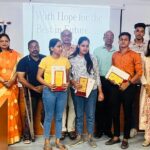
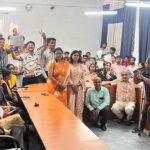





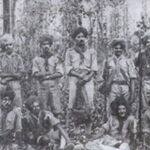
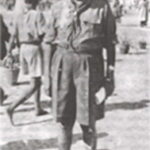
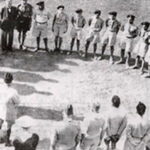
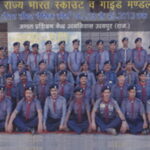
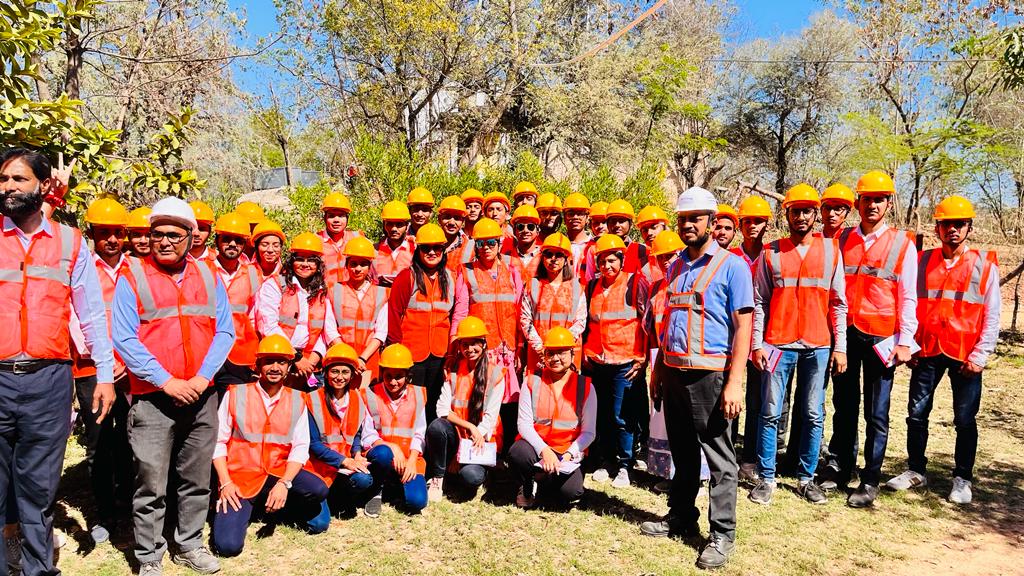
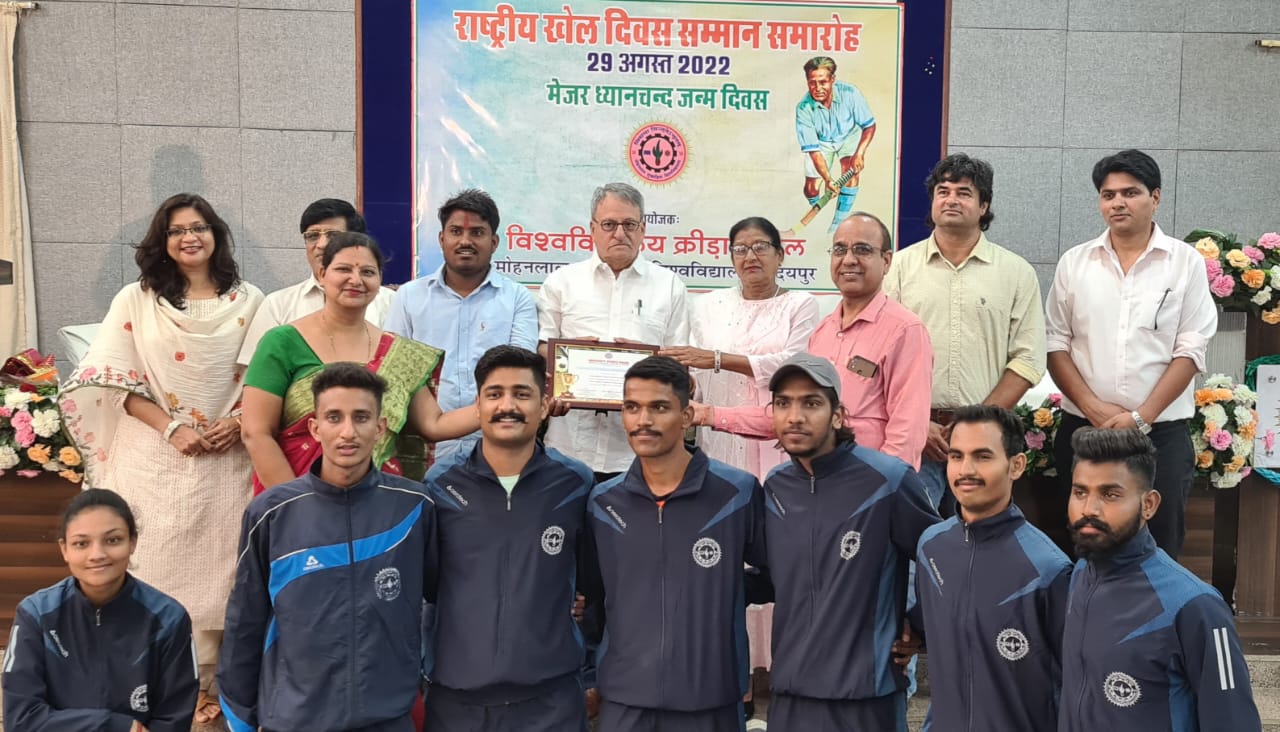


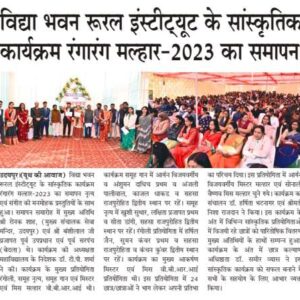
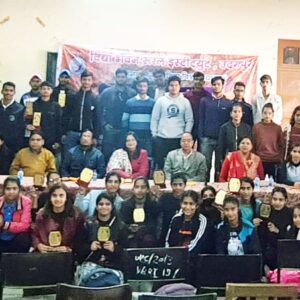

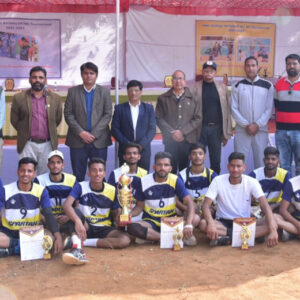



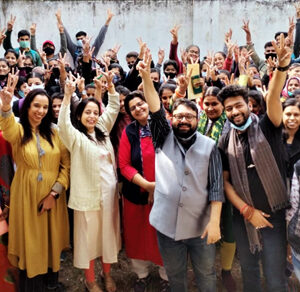

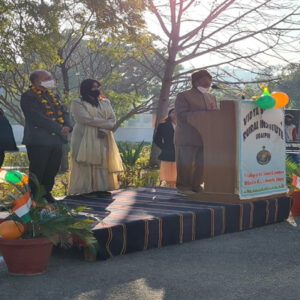





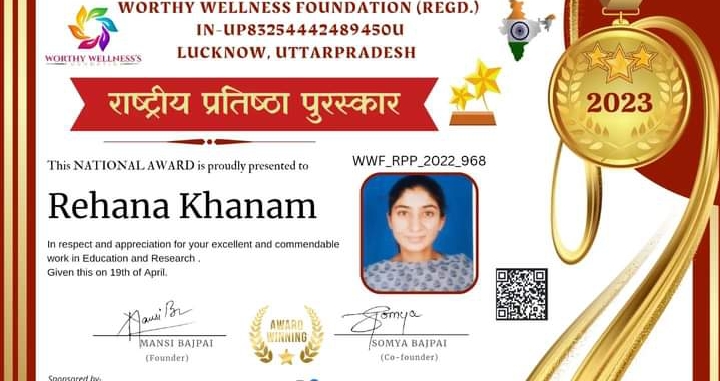





Department of Social Sciences and Humanities
Vidya Bhawan Rural Institute offers Social Sciences and Humanities subjects at Graduation and Post Graduation levels. The Department has been working since 1964. Presently, the Department has 250 seats.
For B.A. Students have to opt three subjects from six groups of ten subjects. The Department also provides Post Graduate degree course (M.A.) in five subjects. The courses offered by the Department of Social Sciences and Humanities provide great carrier opportunities for students in government as well as private sector, particularly in teaching and administrative works. The Department also provides Research facilities in Political Science and Sociology.